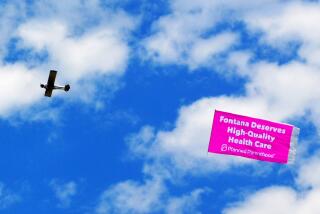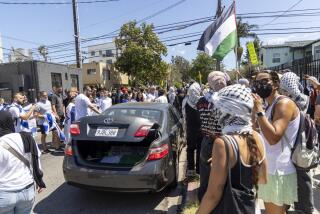As antiabortion protests escalate, new California law will crack down on harassers

SACRAMENTO — Since the U.S. Supreme Court overturned a right to abortion in 2022, providers across California have seen an increase in protests outside their clinics and have scrambled to increase security measures, lobbying cities to enforce ordinances meant to shield patients from outside chaos.
A bill signed into law by Gov. Gavin Newsom on Saturday takes a statewide approach to deterrence, increasing criminal penalties for those who harass or threaten patients entering abortion clinics. The legislation goes further than a decades-old federal law that makes it illegal to threaten or harass people outside of abortion clinics and churches.
The law comes as spending on security measures for Planned Parenthood clinics in the Los Angeles area have “quadrupled” since the overturning of the landmark case Roe vs. Wade, according to Sue Dunlap, president and chief executive of Planned Parenthood Los Angeles.
Dunlap did not disclose the dollar amount spent on security but said it has been used in part to hire guards and is “well into the seven figures” — a total that was “unimaginable” just a few years ago. Thousands of protesters have rallied outside Los Angeles County’s 24 clinics in the last year alone, she said, and providers “regularly” call law enforcement for help controlling them.
“Without a question, the sort of harassment outside of our health centers, and what to me is really terrorism directed at our patients, staff and mission, has increased,” Dunlap said. “All of those protests that we imagine happen in other parts of the country also happen here.”
While they welcome the additional protection, abortion providers also worry that acknowledging the growing problem of protests will deter women from seeking care.
“I say that also wanting to really emphasize that we really work hard to make sure that our health centers are places that are safe and secure,” Dunlap said. “But the challenges of doing that, really ensuring that safety, have increased exponentially over the last few years.”
Abortion rights remain protected in California but providers across the state say harassment has escalated since the 2022 Supreme Court decision to overturn federal abortion protections for all Americans. Abortion rights are now left up to individual states, leaving millions across the nation without care.
Earlier this year, an Orange County man was sentenced to nine years in prison for firebombing a Planned Parenthood clinic in Costa Mesa. Last year, a San Bernardino County man was sentenced to more than two years in prison for shooting at a Planned Parenthood clinic in Pasadena.
Cities including Sacramento and Walnut Creek have approved ordinances since the Supreme Court decision that require “buffer zones” outside abortion clinics, mandating that protesters stay eight feet away from patients. They have also passed ordinances that limit the use of megaphones and other noise amplifiers as patients have reported hearing antiabortion chants from inside exam rooms.
Similar laws have been on the books for years in some parts of the state, including San Francisco, but abortion clinic officials say they have been difficult to enforce. The ordinances have also opened cities up to lawsuits over 1st Amendment rights.
This summer, San Diego amended its decades old buffer zone law, requiring that patients seeking care at abortion clinics must give consent before a protester can approach them “verbally or physically.” An antiabortion activist is suing the city alleging the new policy violates his right to free speech.
“In no other healthcare setting are patients and providers so unjustly and indiscriminately met with hostile opposition,” said Jodi Hicks, chief executive of Planned Parenthood Affiliates of California, which supported the bill.
Under the new state law, AB 2099, those who violate the California Freedom of Access to Clinics and Church Entrances Act could be subject to felony charges. Under the original law, which was passed in 2001 and mirrors federal legislation, those who intimidate, threaten or injure patients entering reproductive health clinics can face misdemeanor charges, jail for up to a year or fines up to $50,000, depending on the crime.
The law signed Saturday makes the crime subject to a felony instead of a misdemeanor.
“With the continued attacks on reproductive rights across the country, California must remain a safe haven for those seeking essential healthcare,” said Assemblymember Rebecca Bauer-Kahan (D-San Ramon) who wrote the law and similar legislation passed in 2021 that cracked down on recordings of abortion patients by protesters. “AB 2099 sends a clear message that we will not tolerate any form of intimidation or violence against those accessing or providing reproductive health services.”
The bill was opposed by the American Civil Liberties Union, which said while it supports abortion access, expanding criminal penalties will not curb the behavior and will add to the state’s growing incarceration costs.
The laws on the books are good enough, the ACLU argued, and lawmakers should instead focus their attention on ensuring that they are better enforced.
Even before the Supreme Court decision overturning federal abortion protections, abortion clinics in Northern California struggled with persistent protests, motivating healthcare officials to change the location of their facilities in San Francisco and Walnut Creek in an attempt to mitigate distractions.
After the decision in 2022, Planned Parenthod Northern California put out a call out for volunteers to escort patients to clinic doors, noting an escalation in protests.
Last week, abortion clinics across the state were bracing for the kickoff of 40 Days for Life, a coordinated national antiabortion campaign. While the organization advertises its events as “peaceful” around-the-clock prayer vigils, California clinics have reported its members to authorities for harassment.
In Walnut Creek, 40 Days for Life hired armed security guards to protect its protesters outside Planned Parenthood, and were charged with battery after using pepper spray on counterprotesters, according to the Contra Costa County District Attorney’s Office.
Representatives for 40 Days for Life’s Walnut Creek and Sacramento chapters did not return a request for comment.
“Even in California, a reproductive freedom state, we continue to deal with hostile and aggressive opposition that requires us to take actions beyond regular operations, which are costly and should be unnecessary” said Gilda Gonzales, chief executive of Planned Parenthood Northern California.
More to Read
Sign up for Essential California
The most important California stories and recommendations in your inbox every morning.
You may occasionally receive promotional content from the Los Angeles Times.











